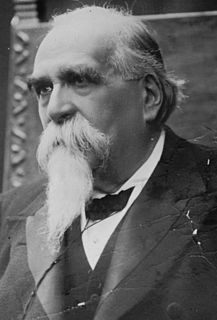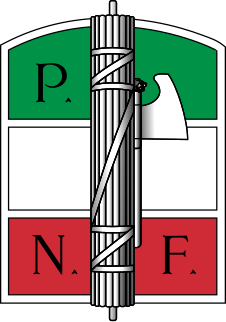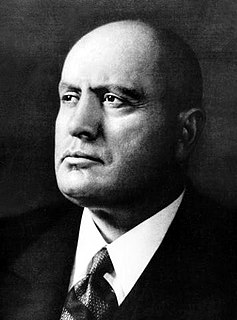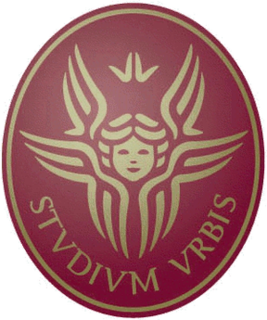
Fascism is a form of radical, right-wing, authoritarian ultranationalism, characterized by dictatorial power, forcible suppression of opposition and strong regimentation of society and of the economy, which came to prominence in early 20th-century Europe. The first fascist movements emerged in Italy during World War I before it spread to other European countries. Opposed to liberalism, Marxism and anarchism, fascism is placed on the far-right within the traditional left–right spectrum.

The President of the Council of Ministers of the Italian Republic, commonly referred to in Italy as Presidente del Consiglio, or informally as Premier and known in English as the Prime Minister of Italy, is the head of government of the Italian Republic. The office of Prime Minister is established by Articles 92 through to 96 of the Constitution of Italy. The Prime Minister is appointed by the President of the Republic after each general election and must have the confidence of the Italian Parliament to stay in office.

Gaetano Salvemini was an Italian anti-fascist politician, historian and writer. Born in a family of modest means, he became an acclaimed historian both in Italy and abroad, in particular in the United States, after he was forced into exile by Mussolini's Fascist regime.

The March on Rome was an organized mass demonstration in October 1922, which resulted in Benito Mussolini's National Fascist Party ascending to power in the Kingdom of Italy. In late October 1922, Fascist Party leaders planned an insurrection, to take place on 28 October. When fascist troops entered Rome, Prime Minister Luigi Facta wished to declare a state of siege, but this was overruled by King Victor Emmanuel III. On the following day, 29 October 1922, the King appointed Mussolini as Prime Minister, thereby transferring political power to the fascists without armed conflict.

Benedetto Croce was an Italian idealist philosopher, historian and politician, who wrote on numerous topics, including philosophy, history, historiography and aesthetics. In most regards, Croce was a liberal, although he opposed laissez-faire free trade and had considerable influence on other Italian intellectuals, including both Marxist Antonio Gramsci and fascist Giovanni Gentile. Croce was President of PEN International, the worldwide writers' association, from 1949 until 1952. He was nominated for the Nobel Prize in Literature sixteen times.

Luigi Luzzatti was an Italian financier, political economist, social philosopher and jurist. He served as the 20th Prime Minister of Italy between 1910 and 1911. He was the first Venetian and second Jewish Prime Minister of Italy after Alessandro Fortis, although his predecessor Sidney Sonnino was of partial Jewish ancestry.

Piero Gobetti was an Italian journalist, intellectual and radical liberal and anti-fascist. He was an exceptionally active campaigner and critic in the crisis years in Italy after the First World War and into the early years of Fascist rule.
The economy of Italy under fascism refers to the economy in Italy between 1922 and 1943 when the fascists were in control. Italy had emerged from World War I in a poor and weakened condition and post-war there was inflation, massive debts and an extended depression. By 1920, the economy was in a massive convulsion—mass unemployment, food shortages, strikes and so on. This conflagration of viewpoints can be exemplified by the so-called Two Red Years.
The history of Fascist ideology is long and involves many sources. Fascists took inspiration from sources as ancient as the Spartans for their focus on racial purity and their emphasis on rule by an elite minority. Fascism has also been connected to the ideals of Plato, though there are key differences between the two. Fascism styled itself as the ideological successor to Rome, particularly the Roman Empire. The Enlightenment-era concept of a "high and noble" Aryan culture as opposed to a "parasitic" Semitic culture was core to Nazi racial views. From the same era, Georg Wilhelm Friedrich Hegel's view on the absolute authority of the state also strongly influenced Fascist thinking. The French Revolution was a major influence insofar as the Nazis saw themselves as fighting back against many of the ideas which it brought to prominence, especially liberalism, liberal democracy and racial equality, whereas on the other hand Fascism drew heavily on the revolutionary ideal of nationalism. Common themes among fascist movements include; nationalism, hierarchy and elitism, militarism, quasi-religion, masculinity and voluntarism. Other aspects of fascism such as its "myth of decadence", anti‐egalitarianism and totalitarianism can be seen to originate from these ideas. These fundamental aspects however, can be attributed to a concept known as "Palingenetic ultranationalism", a theory proposed by Roger Griffin, that fascism is essentially populist ultranationalism sacralized through the myth of national rebirth and regeneration.
The economics of fascism refers to the economic policies implemented by fascist governments. Historians and other scholars disagree on the question of whether a specifically fascist type of economic policy can be said to exist. Baker argues that there is an identifiable economic system in fascism that is distinct from those advocated by other ideologies, comprising essential characteristics that fascist nations shared. Payne, Paxton, Sternhell et al. argue that while fascist economies share some similarities, there is no distinctive form of fascist economic organization. Feldman and Mason argue that fascism is distinguished by an absence of coherent economic ideology and an absence of serious economic thinking. They state that the decisions taken by fascist leaders cannot be explained within a logical economic framework.

Italian Fascism, also known as Classical Fascism or simply Fascism, is the original fascist ideology as developed in Italy. The ideology is associated with a series of three political parties led by Benito Mussolini, namely the Fascist Revolutionary Party (PFR) founded in 1915, the succeeding National Fascist Party (PNF) which was renamed at the Third Fascist Congress on 7–10 November 1921 and ruled the Kingdom of Italy from 1922 until 1943 and the Republican Fascist Party that ruled the Italian Social Republic from 1943 to 1945. Italian Fascism is also associated with the post-war Italian Social Movement and subsequent Italian neo-fascist movements.

Alfredo Rocco was an Italian politician and jurist. Born in Naples, he was Professor of Commercial Law at the University of Urbino (1899–1902) and in Macerata (1902–1905), then Professor of Civil Procedure in Parma, of Business Law in Padua, and later of Economic Legislation at "La Sapienza" University of Rome, of which he was rector from 1932 to 1935.
Il Popolo d'Italia, was an Italian newspaper which published editions every day with the exception for Mondays founded by Benito Mussolini in 1914, after his split from the Italian Socialist Party. The paper was founded as a pro-war newspaper during WW1.

The Kingdom of Italy was a state which existed from 1861—when King Victor Emmanuel II of Sardinia was proclaimed King of Italy—until 1946—when a constitutional referendum led civil discontent to abandon the monarchy and form the modern Italian Republic. The state was founded as a result of the unification of Italy under the influence of the Kingdom of Sardinia, which can be considered its legal predecessor state.

The National Fascist Party was an Italian political party, created by Benito Mussolini as the political expression of fascism. The party ruled Italy from 1922 when Fascists took power with the March on Rome to 1943, when Mussolini was deposed by the Grand Council of Fascism.

Giuseppe Bastianini was an Italian politician and diplomat. Initially associated with the hard-line elements of the fascist movements he later became a member of the dissident tendency.

Arrigo Serpieri was an economist, politician, and agronomist. Serpieri was an expert in agricultural economics, and was undersecretary of the Ministry of Agriculture during the Fascist period.
Liberal socialism is a socialist political philosophy that incorporates liberal principles. Liberal socialism does not have the goal of completely abolishing capitalism and replacing it with socialism, but it instead supports a mixed economy that includes both private property and social ownership in capital goods. Although liberal socialism unequivocally favors a market-based economy, it identifies legalistic and artificial monopolies to be the fault of capitalism and opposes an entirely unregulated economy. It considers both liberty and equality to be compatible and mutually dependent on each other.
Fascist syndicalism was a trade syndicate movement that rose out of the pre-World War II provenance of the revolutionary syndicalism movement led mostly by Edmondo Rossoni, Sergio Panunzio, A. O. Olivetti, Michele Bianchi, Alceste De Ambris, Paolo Orano, Massimo Rocca, and Guido Pighetti, under the influence of Georges Sorel, who was considered the “‘metaphysician’ of syndicalism.” The Fascist Syndicalists differed from other branches of syndicalism in that they generally favored class struggle, worker-controlled factories and hostility to industrialists, which lead historians to portray them as “leftist fascist idealists” who “differed radically from right fascists.” Generally considered one of the more radical Fascist syndicalists in Italy, Rossoni was the “leading exponent of fascist syndicalism.”, and sought to infuse nationalism with “class struggle.”

Fascist Italy is the era of National Fascist Party government from 1922 to 1943 with Benito Mussolini as head of government of the Kingdom of Italy. The fascists imposed totalitarian rule and crushed the political and intellectual opposition, while promoting economic modernization, traditional social values and a rapprochement with the Roman Catholic Church. According to Payne (1996), "[the] Fascist government passed through several relatively distinct phases". The first phase (1923–1925) was nominally a continuation of the parliamentary system, albeit with a "legally-organized executive dictatorship". Then came the second phase, "the construction of the Fascist dictatorship proper, from 1925 to 1929". The third phase, with less activism, was 1929 to 1934. The fourth phase, 1935–1940, was characterized by an aggressive foreign policy: war against Ethiopia, which was launched from Eritrea and Somaliland; confrontations with the League of Nations, leading to sanctions; growing economic autarky; and the signing of the Pact of Steel. The war itself (1940–1943) was the fifth phase with its disasters and defeats, while the rump Salò Government under German control was the final stage (1943–1945).





















